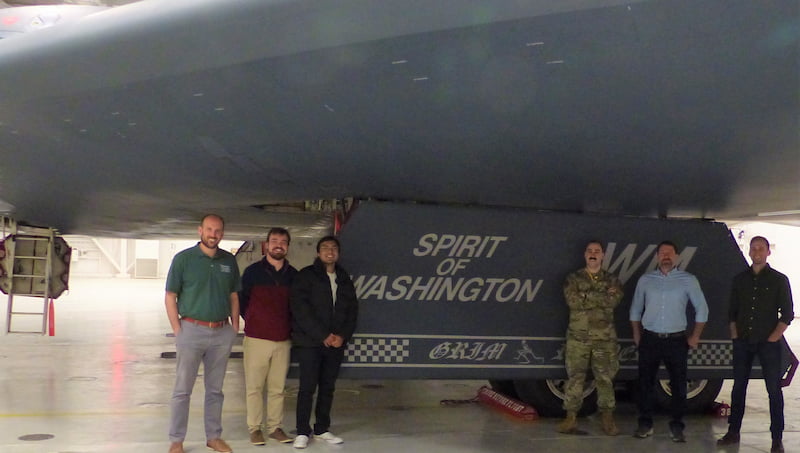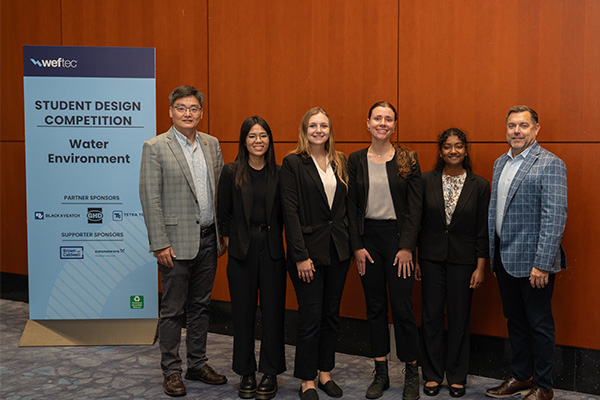Taking experiential education to new heights
Washington University students visit Whiteman Air Force Base

Washington University students in the Innovating for Defense course recently had the opportunity to visit Whiteman Air Force Base in western Missouri to expand their network and participate in activities that few people ever get to experience.
"Visiting Whiteman was an incredible experience,” said Don Soffer, an MBA student in the Olin Business School. “The base tour, conversations with airmen and the opportunity to discuss innovation with the amazing team at Stealthwerx provided the kind of real-world teaching that you can only get outside of the classroom.”
The base visit allowed students to jump into the cockpit to learn about the B-2 Spirit, one of the most advanced aircraft ever created. The B-2 Spirit, also known as the Stealth Bomber, is nearly undetectable to adversaries, yet these WashU students were able to interact with an aircraft that is practically invisible on radar.
“It has been an honor working with the students, faculty and mission partners this semester to engage the great talent at WashU to develop new technologies that solve Department of Defense problems,” said Mike Seper, Washington University program director, National Security Innovation Network. “The students in the Innovating for Defense and Capstone classes were dedicated to understanding the challenges experienced by airmen and soldiers in Missouri through customer discovery interviews and developed outstanding solutions to real-world problems.”
The National Security Innovation Network helps to create these outstanding opportunities for engagement between Washington University and the Department of Defense through interactions with military members across Missouri. NSIN supports faculty innovations and student startups advancing new technologies and partnering with academic, mission and venture communities to encourage inclusivity through innovation.
Jon Shidal, a lecturer in the Department of Computer Science & Engineering in the McKelvey School of Engineering and Capstone instructor, has led the effort to create customized solutions through developing new software. During the visit, Shidal shared that his grandfather was a B-29 Superfortress pilot during World War II, so the opportunity to climb into the B-2 was a special experience.
"Having the unique opportunity to visit Whiteman Air Force Base allowed me to get to know some of the airmen and airwomen we hope to impact with our software, as well as see some really amazing technology up close while asking questions to the experts that maintain and operate it," Shidal said.

Whiteman Air Force Base is known for cutting-edge technology from the Stealthwerx Innovation Office to the B-2 Spirit, which required secret clearance for personnel to view this advanced aircraft during the design and development. Students and faculty participating in Innovation for Defense and Capstone courses had the opportunity to get a private lesson from Major Zack Ziegler, a B-2 and T-38 pilot, on what it is like to fly, refuel and operate missions thousands of miles away.
“These unparalleled opportunities to engage with the Department of Defense and problem sponsors from the U.S. Air Force creates experiential learning opportunities these students will never forget,” Seper said.
“The Innovating for Defense class has provided an experience like no other,” said Luis Acosta, a student in the master of engineering management program in McKelvey Engineering. “There are very few courses on campus that provide such a hands-on approach to real-world problems. I have been able to further develop my entrepreneurial skill set and apply many of the concepts and material I have learned in my previous courses. Working with the U.S. Department of Defense has been a once-in-a-lifetime opportunity that has yielded lessons of its own. Being invited to visit Whiteman Air Force Base put into perspective the far scope of the U.S. military and how there is not another organization like it in the world.”
Students from the course and airmen gathered for interviews to collaborate on a project currently being prototyped. This project, termed Airmen Against Drunk Driving (AADD), is more than an experiential opportunity for the students, but a potentially lifesaving effort to help airmen the same age as the students.
The National Security Innovation Network also worked with the Missouri Army National Guard this semester to bring new challenges to the classroom and to help WashU students explore ways to advance holistic health and fitness through physical, mental, spiritual, sleep and nutritional improvements for soldier readiness.
“Working with the Washington University students on the Innovating for Defense and Capstone projects has been a great experience,” said Major Dorothy McClelland, holistic health & fitness project officer in the Missouri Army National Guard. “I’m impressed how much these WashU students have learned about the National Guard in such a short period of time. They have gained an incredible understanding of the complexity of the Guard and the challenge of implementing holistic health and fitness into the reserve component. Their civilian outlook helped me to expand my perspective, and I am grateful for the students’ enthusiasm, the guidance of the professors and the partnership with WashU and NSIN. Together we will come up with new strategies to solve complex problems. It is a partnership built on a foundation of innovative thinking and I am proud to be part of this team.”
“As Americans, we are all on the same team and we must engage the best and the brightest minds to solve the most difficult problems,” Seper said. “That is why the partnership between Washington University and NSIN was established to create new pathways to service and advance innovation from the classroom to practice for greater national security.”
Learn more about ways to get involved with NSIN at https://www.nsin.mil/




